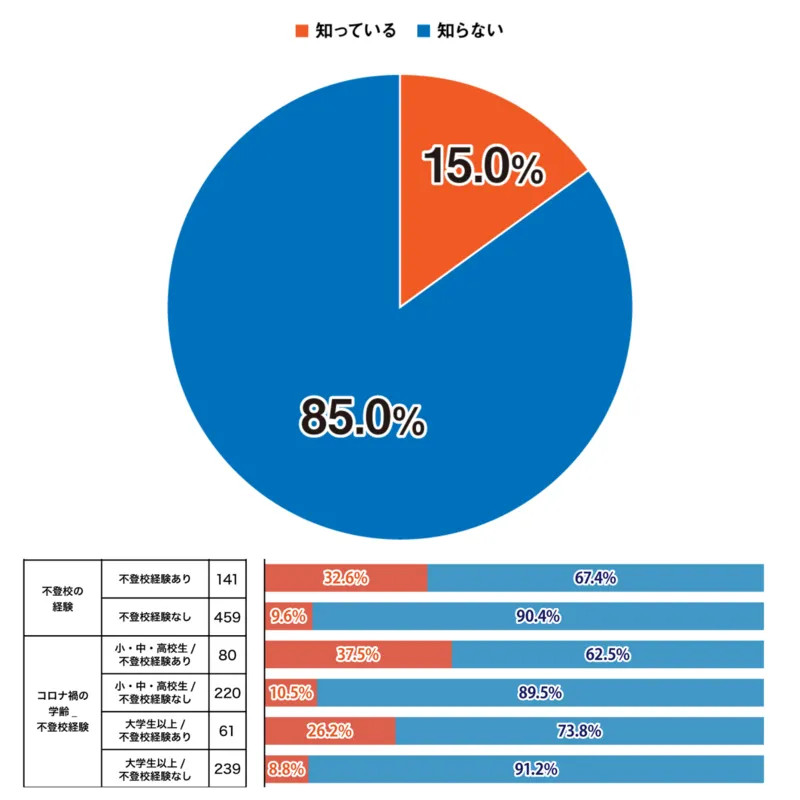

Exploring the Positive Perspectives of School Refusal Among Youth in the COVID-19 Era
Understanding Positive School Refusal Attitudes
Recent research conducted by Premaseed, an educational firm based in Tokyo, uncovered some surprising insights regarding school refusal among students during the COVID-19 pandemic. The study, which targeted 600 individuals—split between those who were high school students and those who were older—aimed to shed light on how perceptions of school refusal have shifted amidst the challenges of the pandemic.
Survey Overview
From April 8 to April 17, 2025, Premaseed initiated a survey focusing on the awareness and sentiments surrounding the term "active school refusal." This concept, defined as the conscious choice not to attend school, is particularly relevant in the context of a global pandemic where educational institutions faced unprecedented disruptions.
Key Findings
1. Awareness of Active School Refusal
Only 15% of respondents were familiar with the term "active school refusal." However, this awareness notably increased among younger respondents who had experienced school refusal, with 37.5% indicating familiarity with the term. This denotes a significant understanding among students who have grappled with traditional school environments during this challenging period.
2. Attitudes Towards School Refusal
When asked about their thoughts on active school refusal, 33% of all respondents expressed positive views, stating they found it to be either "very good" (7.8%) or "good" (25.2%). Among those with school refusal experiences, positive sentiments soared to 50% for younger respondents and 49.2% for those in higher education. This suggests a deeper acceptance and an understanding of the necessity for such choices in contexts where conventional schooling felt increasingly inadequate.
3. The Importance of Educational Choices
An overwhelming 69% of participants believed that students should not feel compelled to attend school if it did not suit them. Particularly, among younger respondents with school refusal experiences, a notable percentage (37.5%) felt some inconvenience should be tolerated in attending school, highlighting a battle between societal expectations and personal well-being.
4. Perceptions of Learning and Development
The research revealed that respondents, especially those who experienced school refusal, placed high value on the importance of core subjects in middle and high school education. 77.8% endorsed the significance of core subjects in middle school education while 71.2% felt the same for high school subjects. This indicates a strong recognition of the relevance of foundational educational components even among those who have faced challenges in conventional schooling.
Perspectives from Premaseed’s CEO
Akihito Iwata, the CEO of Premaseed, commented on the results, emphasizing that while many school-refusing youths hold the belief that education is essential, their experiences led them to seek alternative learning environments. He posits that the ability to embrace active school refusal is a reflection of their desire for a tailored educational experience—a search for a conducive learning environment that resonates with their personal aspirations and mental well-being.
Looking Forward
The study ultimately reveals a paradox: while there is a strong belief among youths that education is essential, those who have faced barriers also advocate for the recognition of diverse paths to learning. With the increasing prevalence of online education and support schools, there is an evolving landscape where traditional educational paradigms are being challenged by innovative approaches that cater to individual needs.
The insights gleaned from Premaseed's research illuminate the need for a societal shift in understanding and supporting the choices of young individuals navigating education amidst pandemic-related disruptions. As such, the future of learning may well depend on how effectively we can accommodate diverse educational experiences to ensure that every student finds their place in the world of education.
Topics Other)










【About Using Articles】
You can freely use the title and article content by linking to the page where the article is posted.
※ Images cannot be used.
【About Links】
Links are free to use.